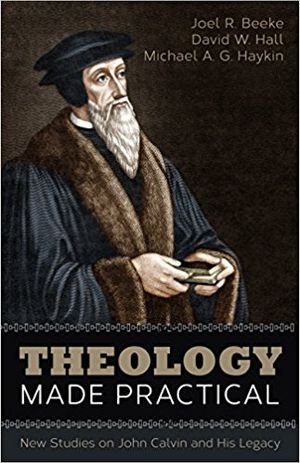This book is a series of essays written by three different men on various aspects of Calvin’s life and theology. Its aim is to demonstrate the practical relevance of his theology. Some of the essays were more successful than others in this regard.
There are four sections: Calvin’s biography, systematic theology, pastoral and political theology, and legacy. With one exception, all three authors contribute to each section.
The first biographical essay is by Michael Haykin. It surveys Calvin’s early life, conversion and training. Haykin also contributes essays on Calvin’s teaching about the Trinity, his missionary endeavours, his vision for the purpose of marriage, and on Calvinism and revival.
Joel Beeke contributes the second biographical article. He considers Calvin’s wife, Idelette, and their marital relationship. Beeke further writes on Calvin’s teaching on election and the Holy Spirit, his preaching, and on the question of whether — in the light of subsequent developments in Reformed thought — Calvin counts as a Calvinist.
The third writer, David Hall, does not contribute to the biographical section, but has essays in all the other sections. His topics are Calvin’s explanation of justification by faith, his view of civil government, the practice of diaconal welfare ministry in Geneva, Calvin’s circle of friends, and that circle’s importance for the propagation of the Reformation.
In his essay on Calvin’s view of government, David Hall demonstrates Calvin’s fearless readiness to comment on political matters. He notes how his words have had tremendous political impact ever since. Recognising that God alone is sovereign, human government is seen to be valid only as a limited administrator of divine judgment.
Calvin was a republican, believing that the overthrow of a corrupt government was just, provided it was done peacefully and through legitimate channels. Hall documents how Calvin derived his political principles from Scripture. For example, Jethro’s advice to Moses in Exodus 18 reveals a divinely-inspired republican and federal plan.
As a preacher, I was encouraged and challenged by Joel Beeke’s essay on Calvin’s preaching, which he defines as ‘experiential’. Despite his fame as a theologian, Calvin saw himself first and foremost as a preacher. Preaching is, for him, God’s main method of salvation — the means by which Christians experience the truth of Christian doctrine in their lives. It comes to fullest expression as sensed fellowship with God. For these reasons application must always be the dominant element, to which everything else in the sermon is subordinate.
Calvin preached consecutively. He studied and prepared thoroughly and then preached without notes. He divided his sermon into points only as the text dictated. He also recognised that the impact of the Word is inseparable from the powerful work of the Spirit.
Michael Haykin’s essay on revival as part of Calvin’s legacy concludes the book. The bulk of this essay focuses on the revival which took place among eighteenth-century English Particular Baptists. It followed a period of fairly rapid decline during which the churches had succumbed to a dead and inactive hyper-Calvinism. Instrumental in changing things was Andrew Fuller, who challenged the churches to pray.
In 1784, the pastors of the Northamptonshire Baptist Association issued a call to prayer to the churches. They recommended monthly meetings to pray specifically for the outpouring of God’s Spirit upon all churches and the spread of the gospel to the ends of the earth. Over the next 60 years, the number of Particular Baptist congregations in England increased dramatically and, in 1792, the Baptist Missionary Society was founded and sent William Carey to India.
Haykin’s and the book’s final sentence commends ‘a profound awareness that the Spirit’s blessing and empowerment in personal and corporate revival is the most important aspect of the believer’s and the church’s life’ (p.246). Amen and hallelujah!
Jonathan Bayes
Thirsk








